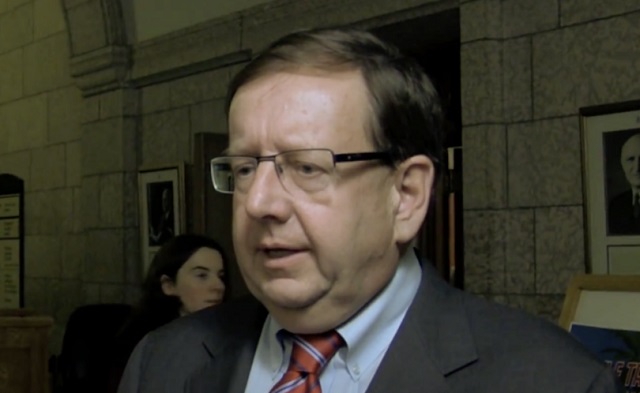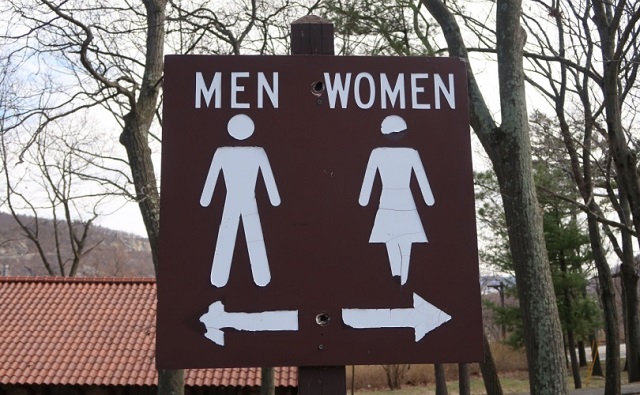National
Top Liberal says Trudeau should step down as party leader amid dismal polling

Senator Percy Downe
From LifeSiteNews
If the next Liberal Leader is able to bring the party back to the center of the political spectrum, Liberals have a chance of being reelected,’ Senator Percy Downe wrote in an op-ed earlier this week
Amid dismal polling numbers, a Liberal Party of Canada stalwart-turned-senator said the party needs to look for a new leader to replace Justin Trudeau.
The comments were made by Senator Percy Downe, who served as former Liberal Prime Minister Jean Chrétien’s chief of staff, from 2001 to 2003. Downe was appointed a senator by Chrétien in 2003.
On Wednesday, in an opinion piece for National Newswatch, Downe said that the “prudent course of action” is for another “Liberal Leader to rise from the impressive Liberal caucus and safeguard those policies [Trudeau] was actually able to accomplish.”
“If the next Liberal Leader is able to bring the party back to the center of the political spectrum, Liberals have a chance of being reelected,” he wrote.
Downe claimed that the party needs a new leader as it is the only one that has a “realistic chance of stopping a government led by Pierre Poilievre [the current Conservative leader].”
Recent polling shows that support for Poilievre’s Conservative Party is hitting positive levels not seen since the early days of former Prime Minister Stephen Harper. Indeed, a Federal @338Canada model has the “Outcome Odds” for a Conservative majority government at 95 percent.
Digging a little deeper, a recent Leger poll shows the Conservatives taking some 211 seats, a gain of 90 seats (well over the majority of 170 needed) with the Trudeau Liberals losing some 90 seats to win only 70 if an election were held today.
According to Downe, the opportunity for a Poilievre government was “created by a lack of fiscal responsibility in the Trudeau government, and the damage it caused our economy is now showing up in the opinion poll numbers.”
He also said that more centrist Liberal Party members became reluctant to support Trudeau after realizing they could not persuade him to spend less money.
“That naiveté was replaced with the realization that they were not a serious government when it came to the economy, that they simply didn’t care and would throw money at anything that crossed their mind. The resulting interest rate hikes, increasing cost of living, and huge debt didn’t seem to concern them,” he wrote.
Despite calling for Trudeau to be replaced, Downe expressed a lyrical sentiment toward the prime minister, saying “many party members are also grateful that Justin’s greatest accomplishment as leader has been his success in recruiting multitalented Canadians to serve in Parliament.”
Liberal heavyweight claims Trudeau could step down as early as February
Downe suggested, in a recent Hill Times interview, that he thinks Trudeau could step down as party leader as early as February of 2024. This was in the same month in 1984 that Trudeau’s father, Pierre Yves Elliott Trudeau, decided he was not going to seek re-election. Later that same year, the Conservatives under Brian Mulroney won in a landslide.
He claimed that there is a “possibility that under our first-past-the-post electoral system, Justin and the NDP could squeeze enough seats to form a minority government.”
The Liberal Party, which has a minority government, formed an informal coalition with the New Democratic Party (NDP) last year, with the latter agreeing to support and keep the former in power until the next election is mandated by law in 2025.
However, Downe noted about this possible outcome, that the “questions for Justin Trudeau are: given the divisions in our country, is that the best result for Canada, and is it the best result for Justin personally?”
Earlier this week, Poilievre dared Trudeau to call a “carbon tax” election so Canadians can decide for themselves if they want a government for or against a tax that has caused home heating bills to double in some provinces.
The controversy around the carbon tax “pause” came after Trudeau announced last week he was pausing the collection of the carbon tax on home heating oil in Atlantic Canadian provinces for three years. Trudeau’s announcement came amid dismal polling numbers showing his government will be defeated in a landslide by the Conservative Party come the next election.
Business
UN plastics plans are unscientific and unrealistic

News release from the Coalition of Concerned Manufacturers and Businesses of Canada
“We must focus on practical solutions and upgrading our recycling infrastructure, not ridiculous restrictions that will harm our health care system, sanitary food supply, increase costs and endanger Canadians’ safety, among other downsides.”
This week Ottawa welcomes 4,000 delegates from the United Nations to discuss how they will oversee a reduction and even possible elimination of plastics from our lives. The key problem is no one has ever figured out how they will replace this essential component of our modern economy and society. The Coalition of Concerned Manufacturers and Businesses of Canada (CCMBC) has launched an information campaign to discuss the realities of plastic, how it contributes massively to our society and the foolishness of those who think plastics can be eliminated or greatly reduced without creating serious problems for key industries such as health care, sanitary food provision, many essential consumer products and safety/protective equipment, among others. CCMBC President Catherine Swift said “The key goal should be to keep plastics in the economy and out of the environment, not eliminate many valuable and irreplaceable plastic items. The plastics and petrochemical industries represent about 300,000 jobs and tens of billions contribution to GDP in Canada, and are on a growth trend.”
The UN campaign to ban plastics to date has been thwarted by reality and facts. UN efforts to eliminate plastics began in 2017, motivated by such terrible images as rivers with massive amounts of floating plastic and animals suffering from negative effects of plastic materials. Although these images were dramatic and disturbing, they do not represent the big picture of what is really happening and do not take into account the many ways plastics are hugely positive elements of modern society. Swift added “Furthermore, Canada is not one of the problem countries with respect to plastics waste. Developing countries are the main culprits and any solution must involve helping the leading plastics polluters find workable solutions and better recycling technology and practices.”
The main goal of plastic is to preserve and protect. Can you imagine health care without sanitary, flexible, irreplaceable and recyclable plastic products? How would we keep our food fresh, clean and healthy without plastic wraps and packaging? Plastic replaces many heavier and less durable materials in so many consumer products too numerous to count. Plastics help the environment by reducing food waste, replacing heavier materials in automobiles and other products that make them more energy-efficient. Many plastics are infinitely recyclable and innovations are taking place to improve them constantly. What is also less known is that most of the replacements for plastics are more expensive and actually worse for the environment.
Swift stated “Environment Minister Steven Guilbeault has been convinced by the superficial arguments that plastics are always bad despite the facts. He has pursued a campaign against all plastics as a result, without factoring in the reality of the immense value of plastic products and that nothing can replace their many attributes. Fortunately, the Canadian Federal court overturned his absurd ban on a number of plastic products on the basis that it was unscientific, impractical and impinged upon provincial jurisdiction.” Sadly, Guilbeault and his Liberal cohorts plan to appeal this legal decision despite its common-sense conclusions. Opinion polls of Canadians show that a strong majority would prefer this government abandon its plastics crusade at this point, but history shows these Liberals prefer pursuing their unrealistic and costly ideologies instead of policies that Canadians support.
The bottom line is that plastics are an essential part of our modern society and opposition has been based on erroneous premises and ill-informed environmentalist claims. Swift concluded “Canada’s record on plastics is one of the best in the world. This doesn’t mean the status quo is sufficient, but we must focus on practical solutions and upgrading our recycling infrastructure, not ridiculous restrictions that will harm our health care system, sanitary food supply, increase costs and endanger Canadians’ safety, among other downsides.” The current Liberal government approach is one that has no basis in fact or science and emphasizes virtue-signaling over tangible and measurable results. Swift noted “The UN’s original founding purpose after World War II was to prevent another world war. Given our fractious international climate, they should stick to their original goal instead of promoting social justice warrior causes that are unhelpful and expensive.”
The CCMBC was formed in 2016 with a mandate to advocate for proactive and innovative policies that are conducive to manufacturing and business retention and safeguarding job growth in Canada.
SOURCE Coalition of Concerned Manufacturers and Businesses of Canada
Addictions
Why can’t we just say no?

From the Frontier Centre for Public Policy
Drug use and violence have become common place in hospitals. Drug-addicted patients openly smoke meth and fentanyl, and inject heroin. Dealers traffic illicit drugs. Nurses are harassed, forced to work amidst the toxic fumes from drugs and can’t confiscate weapons. In short, according to one nurse, “We’ve absolutely lost control.”
“Defining deviancy down” is a cultural philosophy that emerged in the United States during the 1990s.
It refers to society’s tendency to adjust its standards of deviancy “down,” so that behaviours which were once unacceptable become acceptable. Over time, this newly- acceptable behaviour can even become society’s norm.
Of course, the converse must also be true — society looks down on those who label social behaviours “wrong,” deeming them moralistic, judgemental or simply out of touch with the realities of modern life.
Thirty years later, this philosophy is entrenched in British Columbia politics and policies. The province has become a society that cannot say “no” to harmful or wrong behaviours related to drug use. It doesn’t matter if you view drug use as a medical issue, a law-and-order issue, or both – we have lost the ability to simply say “no” to harmful or wrong behaviour.
That much has become abundantly clear over the past two weeks as evidence mounts that BC’s experiment with decriminalization and safe supply of hard drugs is only making things worse.
A recently-leaked memo from BC’s Northern Health Authority shows the deleterious impact these measures have had on BC’s hospitals.
The memo instructs staff at the region’s hospitals to tolerate and not intervene with illegal drug use by patients. Apparently, staff should not be taking away any drugs or personal items like a knife or other weapons under four inches long. Staff cannot restrict visitors even if they are openly bringing illicit drugs into the hospital and conducting their drug transactions in the hallways.
The public was quite rightly outraged at the news and BC’s Health Minister Adrian Dix quickly attempted to contain the mess by saying that the memo was outdated and poorly worded.
But his facile excuses were quickly exposed by publication of the very clearly worded memo and by nurses from across the province who came forward to tell their stories of what is really happening in our hospitals.
The President of the BC Nurses Union, Adriane Gear, said the issue was “widespread” and “of significant magnitude.” She commented that the problems in hospitals spiked once the province decriminalized drugs. In a telling quote, she said, “Before there would be behaviours that just wouldn’t be tolerated, whereas now, because of decriminalization, it is being tolerated.”
Other nurses said the problem wasn’t limited to the Northern Health Authority. They came forward (both anonymously and openly) to say that drug use and violence have become common place in hospitals. Drug-addicted patients openly smoke meth and fentanyl, and inject heroin. Dealers traffic illicit drugs. Nurses are harassed, forced to work amidst the toxic fumes from drugs and can’t confiscate weapons. In short, according to one nurse, “We’ve absolutely lost control.”
People think that drug policies have no impact on those outside of drug circles – but what about those who have to share a room with a drug-smoking patient?
No wonder healthcare workers are demoralized and leaving in droves. Maybe it isn’t just related to the chaos of Covid.
The shibboleth of decriminalization faced further damage when Fiona Wilson, the deputy chief of Vancouver’s Police Department, testified before a federal Parliamentary committee to say that the policy has been a failure. There have been more negative impacts than positive, and no decreases in overdose deaths or the overdose rate. (If such data emerged from any other healthcare experiment, it would immediately be shut down).
Wison also confirmed that safe supply drugs are being re-directed to illegal markets and now account for 50% of safe supply drugs that are seized. Her words echoed those of BC’s nurses when she told the committee that the police, “have absolutely no authority to address the problem of drug use.”
Once Premier David Eby and Health Minister Adrian Dix stopped denying that drug use was occurring in hospitals, they continued their laissez-faire approach to illegal drugs with a plan to create “safe consumption sites” at hospitals. When that lacked public appeal, Mr. Dix said the province would establish a task force to study the issue.
What exactly needs to be studied?
The NDP government appears to be uninformed, at best, and dishonest, at worst. It has backed itself into a corner and is now taking frantic and even ludicrous steps to legitimize its experimental policy of decriminalization. The realities that show it is not working and is creating harm towards others and toward institutions that should be a haven for healing.
How quickly we have become a society that lacks the moral will – and the moral credibility – to just to say “no.”
Susan Martinuk is a Senior Fellow with the Frontier Centre for Public Policy and author of Patients at Risk: Exposing Canada’s Health-care Crisis.
-

 Business13 hours ago
Business13 hours agoUN plastics plans are unscientific and unrealistic
-

 Brownstone Institute16 hours ago
Brownstone Institute16 hours agoThe Teams Are Set for World War III
-

 Education11 hours ago
Education11 hours agoSupport a young reader through the Tim Hortons Smile Cookie campaign
-

 Opinion14 hours ago
Opinion14 hours agoThe Climate-Alarmist Movement Has A Big PR Problem On Its Hands
-

 Addictions15 hours ago
Addictions15 hours agoWhy can’t we just say no?
-

 Energy2 days ago
Energy2 days agoNet Zero’s days are numbered? Why Europeans are souring on the climate agenda
-

 Opinion2 days ago
Opinion2 days agoQuebec’s ban on gender-neutral bathrooms in schools is good news
-

 Energy2 days ago
Energy2 days agoHouses passes bill to protect domestic oil production, protect Iñupiat community



